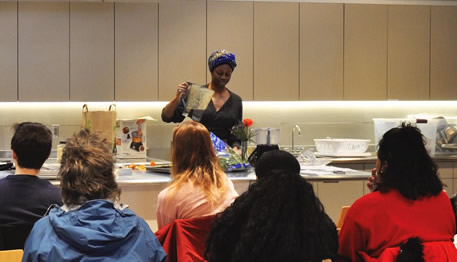Commercial Tobacco Use
- Commercial Tobacco Use Home
- Data and Reports
- Get Help Quitting
- Prevention and Treatment
- Tobacco and Your Health
Learn More
- Behavioral Health and Commercial Tobacco
- E-cigarettes and Vaping
- Flavored Commercial Tobacco
- Menthol Commercial Tobacco
- Nicotine and Nicotine Dependence
- Nicotine Pouches and Other Emerging Products
- Promoting Quitting and Treatment
- Secondhand Smoke and Aerosol
- Traditional and Sacred Tobacco
Related Topics
Contact Info
Champion for LGBTQ Health Sees Progress
Advocate Joie Adebanjo educates LGBTQ community members about commercial tobacco harms
5/18/2020

In recent years advocates for the LGBTQ community have fought hard to reduce discrimination, and increase fairness for people who are LGBTQ. Marriage equality is now the law of the land. Changing the gender listed on one’s driver’s license is easier. Queer culture is more visible in arts, entertainment, and the media.
Yet much work clearly remains. While there are more resources available for equitable health care, mental health care, housing, and other support, they’re not available in all areas of the state. Social media helps people who are LGBTQ connect as a community—but also makes it easier to target them with hate and violence. The commercial tobacco and vaping industries are still spending millions each year to market tobacco to the LGBTQ community—especially targeting young LGBTQ folks with the deceptive message that vaping is a way to look like an adult and to “belong.”
Staff members at Shift MN, a program of JustUs Health, are fighting back—making progress in reducing the high rates of commercial tobacco use among people who are LGBTQ. The organization is supported in its community-based efforts as one of eleven recipients of a Tobacco-Free Communities (TFC) grant from the Minnesota Department of Health. TFC is a program to reduce smoking, prevent youth commercial tobacco use, and address tobacco-related disparities in Minnesota. The TFC grant program is part of a growing movement to promote community-driven commercial tobacco prevention and control activities and strategies.
Listening to the community
Joie Adebanjo, former program associate with Shift MN, was drawn to this work because it offers them an opportunity to improve health by uplifting, embracing, and listening to their community. They are hearing a lot about the social and economic injustice behind commercial tobacco marketing, and about how difficult it can be for people to get accurate information.
“Combustible [forms of commercial tobacco] are well-researched; vaping is not. It’s been exploding in the last few years. People—even kids—are going to rehab for vaping,” they observed. “We need information on e-cigs. Accessible information—not long research papers, but things people can read and share. And resources for stress management, health and wellness, not focused on detrimental ways of dealing with stress, like tobacco.”
Vaping industry is targeting LGBTQ youth
Industry marketing, of course, doesn’t warn of the highly addictive nature of vaping, the high concentrations of nicotine in vaping liquid, or that vaping isn’t an effective way to quit. “Folks are confused, trying to find something that works for them for quitting,” says Adebanjo. “They’re victims of harmful marketing.”
ShiftMN events “expand queer space” that is substance-free
LGBTQ communities have a long history of bar and nightclub culture as those were (and continue to be) spaces where people could go to be safe(r) and be themselves. Unfortunately, bars and clubs also tend to glorify and promote commercial tobacco. Shift MN research shows a need for more safe, queer-friendly alternatives to “the bar scene.” Adebanjo and their team organize free dance parties, gallery showings, coffee and conversation, and other events that “expand queer space,” and are alcohol-, substance-, and nicotine-free. “These are places where people can socialize and discuss LGBTQ topics without the filter.”
These events foster community and let people relieve stress in healthy ways. “Folks can get swept up in isolation because we feel misunderstood or misheard, and aren’t finding the support we need,” said Adebanjo. “That’s stressful. We need a chance to live healthy lives and be ourselves without being attacked. We’re giving folks a place to escape how cruel reality can be.”
Community feedback has been very positive. “At one of our dance parties, a person came up and said they appreciated how the event was curated—that they enjoyed being at the center of an event with LGBTQ performers and people,” they said. “It’s nice to feel affirmed in my work.”
Adebanjo is eager to take what they have learned and the skills they’ve gained and apply them to future nonprofit work. “I’ve learned ways to advocate for myself and my community at the state level, that things can get better with enough work—and that it’s okay to take a break, but I shouldn’t give up. It might not always feel like it, but your work will benefit somebody, someone who might not be able to speak for themselves.”
Learn more about JustUs Health at www.justushealth.org.
Download this story: Champion for LGBTQ Health Sees Progress (PDF)
More stories about community grantees
The Tobacco-Free Communities Grant Program funds local community grants and technical assistance and training grants that aim to reduce and prevent youth tobacco use and address tobacco-related disparities in Minnesota by promoting community-driven tobacco prevention and control activities and strategies.
Learn more about the Tobacco-Free Communities Grant Program and read grantee stories featuring their work throughout Minnesota communities.